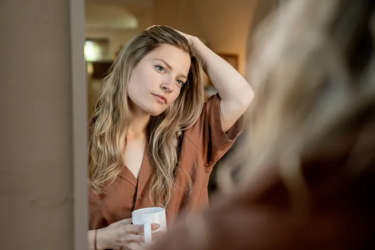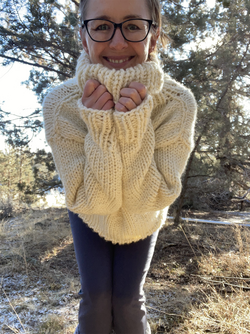Raise Your Hand If You’re Middle-Aged and Questioning Your Gender
How exploring a nonbinary identity has helped me find a better understanding of my womanhood
Y.L. Wolfe
Photo by Kevin Malik via Pexels
If you had told me ten years ago that middle age would have me questioning my gender identity, I would have laughed in your face. For one thing, I’m not even sure I truly understood what that meant back then. But I also felt firmly entrenched in womanhood.
Perhaps that’s where this story begins. Perhaps it is how I ended up here.
When I say I felt firmly entrenched in womanhood, I mean it. Entrenched, drenched, anchored, and, frankly, trapped. And I’ve felt that way most of my life.
I always loved being a girl — but I also hated it, because I saw from a very young age how much it limited me. I wanted to run around screaming and hollering with my shirt off like the boys in my neighborhood. I wanted to climb trees alongside them and lie spread-eagle in the grass without their mothers yelling at me to pull my skirt down or keep my legs together.
I felt it was all viciously unfair.
By the time I was 19, I was a very angry young woman. Believe it or not, I was angry at the injustices of womanhood before I even met my first boyfriend, a man whose treatment of me only made me an angrier woman.
I hated that it was okay for him to scream at me and tell me what a fat, disgusting pig I was, barely a woman. But I couldn’t say anything because I’d always been taught never to emasculate a man by challenging him or punching back.
When I got pregnant, I hated that I was the one who was sick and throwing up all day long, unable to do much of anything other than focus on trying to keep my meals down, while he didn’t have to endure any pain, any nausea, any issues at all. He got to continue living his life, unchanged, staying out late to smoke pot with his friends. I was furious.
In my mind, everything that was wrong had befallen me for no other reason than that I was a woman.
By my mid-twenties, I discovered that there was a way to game the system: If I just fell in line, things would be okay. If I could just be a real woman, then I wouldn’t hate being a woman so very much.
I had plenty of help in that area. Everyone seemed willing to point out my failings as a woman — magazines, TV shows, movies. And above all, men.
Men I encountered in grocery stores or on campus often felt free to make comments about my appearance or the way I walked. They said I was fat, clumsy, and that I kinda looked like a man with big cans.
It got worse with the ones I dated. They didn’t seem to mind anything before we were more “intimately entangled,” but afterwards, they were brutal. Didn’t I know that a real woman wasn’t so fat? A real woman has a concave belly. A real woman has a gap between her thighs. A real woman has an ass that curves upward, not one that droops.
If I discreetly burped during a meal, a date would cringe, at best, while a few of them told me I had disgusting habits that a real woman should not have. One boyfriend warned me never to fart in front of him, and another told me if I ever had to use a toilet, he needed me to use a code like “powder my nose” because the thought of a woman urinating or defecating was disgusting to him.
In my thirties, other women were joining in with the gender policing. Didn’t I want to get married and have kids, like a normal woman? Why wasn’t I trying harder to find the right man, like a real woman would do? Didn’t I understand that I was born with a uterus for a reason?
I could see the pressure they felt. Even then, I knew some of them were marrying the wrong guy because they wanted so badly for others to see them as real women. We all knew we’d get points for becoming a man’s wife, and a gold star for every baby.
Hell, let’s be honest: I would’ve married the wrong guy, too, if the one I was with at the time had been even the slightest bit willing to take that journey down the aisle.
All I wanted was for others to recognize me as a real woman.
It is painful to look back on my life and realize how pressured I felt to nourish and protect men’s sense of their masculinity, while they seemed to feel it was necessary to attack my sense of my femininity. Seriously, think about it: Why do we have a word for the damage we do to men’s experience of their “man-ness” (emasculate) but we don’t have a correlating word to describe the ways we tear down women’s experience of their “woman-ness?”
I wish I could honestly say that I believe the reason behind that is that we don’t realize how traumatizing it is for women’s gender identity to be ripped to shreds the same way we understand how it feels to men. In truth, I think the reason is that we do understand it.
Destroying women’s perception of their womanhood has one distinct purpose: to keep us performing our gender as the patriarchy dictates. It’s the perfect strategy — the absolute best way to ensure women will subjugate themselves.
If we act in ways that are not upholding the patriarchy, we will be reminded that we are not behaving like a lady, that we’re not a “real” woman, that we “might as well be a man.” These remarks are meant to leave a scar and pressure us into conforming to patriarchal standards of femininity.
The only problem is, conforming to those standards of femininity is impossible, as I’ve discovered over the years. I have never been able to achieve a body that a “real” woman would have, even with the “help” of violent eating disorders. I cannot help the fact that I have bodily functions just like everyone else with a digestive system. I also have body hair as mammals tend to do.
These are all things I cannot change without medical intervention, and in some cases, there is no intervention available. You can’t, after all, remove a person’s intestines.
I tried, though. I truly did. There was always another diet, another manicure, another haircut. Maybe I’d finally get there — to real womanliness.
I didn’t truly understand that this was a rigged game until I was in my forties.
I was so excited when people started calling themselves nonbinary and using “they/them” pronouns. Something about it felt audacious. A part of me wanted to do the same, but I wasn’t quite sure it was a fit. Something in me still feels a strong connection to a sense of womanhood even though I knew my version of womanhood would never been recognized in a patriarchy.
But when I discovered there were women out there who identified as nonbinary women, I immediately knew my pronouns were “she/they.” And please don’t call me Ms. Wolfe. No one does, anyways. I’ve almost never had anyone actually call me Ms. — they usually default to Mrs. which I have hated my entire life. No, I’d much rather be Mx. Wolfe. Yes, doesn’t that even look right?
These were things that I knew were true. But somehow, that still didn’t help me understand my gender identity better. It seemed more expansive…yet not quite right.
I have never not felt like a woman. The problem is — I never felt like a woman as society defines that word. And that’s where I’ve been tripped up all these years. It’s not that I’m not a real woman.
The problem is that a patriarchal society has no intention of validating my womanhood because it needs me to keep striving for its standards of womanhood.
Though I’m not saying I’m not nonbinary — I’m not sure yet — I am coming to a better understanding of why I’ve been gravitating in that direction. As transfeminine, gender-nonconforming poet, comedian, and actor ALOK said on the We Can Do Hard Things podcast, many people are choosing nonbinary simply to remove themselves from the binary system — which, in itself, creates another sort of binary. Instead, ALOK suggests we question what these gender identities really mean and dare to embody them in ways that expand manhood and womanhood, rather than leaping to a nonbinary label. They said,
“What I’m asking people to do is to author their own version of womanhood, their own version of manhood, their own version of gender… Stop standardizing one singular definition of manhood and womanhood for everyone.”
This is where I feel I must take the next leg of my journey — not to explore whether or not I’m nonbinary, but to decide what it means to be a woman to me.
I admit, I don’t know how to be a woman. I used to think that was more evidence that I had failed at womanhood.
Now I realize that I feel that way because there is no one way to be a woman. That is the violence of the patriarchy policing our gender identity and shaming us when we don’t conform.
I’m trying to understand what womanhood means to me today. What it looks like. What it feels like. In all honesty, it’s hard to ask myself these questions. The decades of shaming I’ve experienced around my failure to achieve this society’s standards of femininity have left deep scars. Any time I try to make space for myself to not conform (i.e. choosing not to shave my legs, going to the grocery store without wearing makeup), I feel shame and fear. Something about it feels very primal — and maybe it is, knowing how deeply society is ingrained in the cult of gender. This feels like the kind of stuff you can get kicked out of the village for.
I have already experienced some of the challenges that will come with daring to stretch the definition of womanhood. There have been countless comments, criticisms, and even cruelty about my body hair, marital status, and the fact that I don’t have children. Choosing to embrace all this as part of my journey as a woman will not, unfortunately, change other people’s perception of my alleged failure at womanhood.
But I believe this is a critical step that every woman — and, in fact, every man — has to take in order to truly know themselves.
We have been told who we are since someone announced our gender after looking at us on a sonogram screen. Isn’t it about time we decide for ourselves?
Y.L. Wolfe is a gender-curious, solosexual, perimenopausal, childless crone-in-training, exploring these experiences through writing, photography, and art. You can find more of her work at yaelwolfe.com. If you love her writing, leave her a tip over at Ko-fi.


